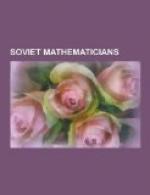|
This section contains 240 words (approx. 1 page at 300 words per page) |
World of Scientific Discovery on Andrei Nikolaevich Kolmogorov
One of the great geniuses of modern Russian mathematics is Andrei Nikolaevich Kolmogorov. Kolmogorov was born in Tambov on April 25, 1903. After completing high school in his home town, he enrolled at Moscow University, from which he received his degree in 1925. After graduation, Kolmogorov accepted a teaching position at Moscow and eventually became full professor of mathematics (1931) and Head of the University (1937).
Kolmogorov's research has extended to a wide variety of topics including real variables, topology, logic, set theory, trigonometric series, and the theory of functions. He is perhaps best known for his work on the theory of algorithms, on the analysis of Markov processes, and--most of all--on probability theory.
Beginning in the 1920s, Kolmogorov set out to develop a complete and consistent set of axioms on which to base all of probability theory. His final system makes use of a set of "elementary events" that can be used in various combinations to describe all conceivable situations in probability theory. Kolmogorov's analysis of probability is still regarded by many mathematicians as the most complete and logical development of this subject.
Kolmogorov was elected a member of the USSR (now Russian) Academy of Sciences in 1939. He long had a special interest in the problems of secondary mathematical education and served for many years as chairman of the Academy Committee on Mathematical Education. After his retirement in 1963, he spent the next 20 years teaching high school. Kolmogorov died in Moscow on October 20, 1987.
|
This section contains 240 words (approx. 1 page at 300 words per page) |


